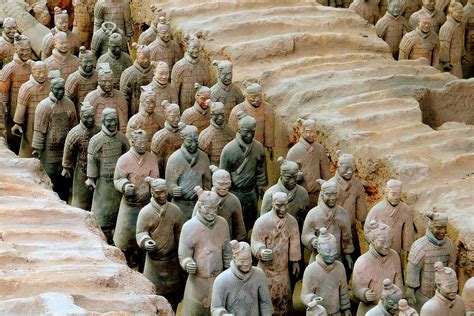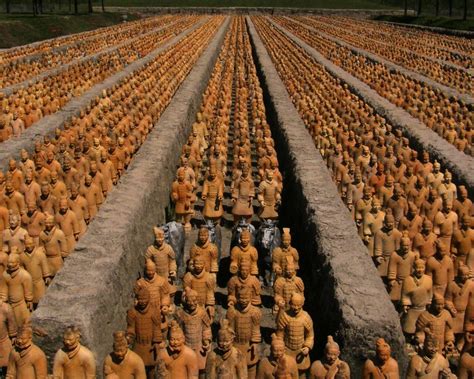china first emperor tomb excavation Learn about the first emperor of China, his opulent tomb complex and the army of clay soldiers that guard it. Find out why the central tomb remains unexcavated and what . Browse through Kubota's Compact Excavators inventory, filter search by features to find the best fit for you, or even build your own. Then find a dealer close by with your desired product!
0 · where was qin shi huang buried
1 · terracotta warriors official website
2 · terracotta warriors museum official website
3 · terracotta army official website
4 · qin shi huangdi tomb inside
5 · has qin shi huang's tomb been opened
6 · emperor qin shi huangdi tomb
7 · archaeologists are too scared to open up the tomb of china’s first emperor
View and Download Takeuchi TB216 operator's manual online. Mini Excavator. TB216 compact excavator pdf manual download. Also for: 216000002, 216100002.
It appears that the mission of this Terracotta Army was to guard the nearby mausoleum of Qin Shi Huang, the formidable first emperor of the Qin dynasty who ruled from . Learn about the first emperor of China, his opulent tomb complex and the army of clay soldiers that guard it. Find out why the central tomb remains unexcavated and what .
342 mustang skid steer hydraulic oil
Learn the reasons why the underground palace of the First Qin Emperor remains unexcavated, such as limited technology, deep depth, long time, and environmental risk. Find . Qin tomb is the burial place of the first Qin emperor, who unified China and built the Great Wall. It contains a vast underground palace, a terra-cotta army, and other treasures, but the tomb itself remains unexcavated. Near the unexcavated tomb of Qin Shi Huang —who proclaimed himself first emperor of China in 221 B.C.E.—lay an extraordinary underground treasure: an entire army of .
Archaeologists have unearthed a 16-tonne coffin and a lavish funerary collection at the Terracotta Warrior complex of China’s first emperor. The tomb is likely the burial of Prince .
3 point poast pounder converted to skid steer
Qin Shi Huangdi (259 BC - 210 BC), the first emperor of China, ascended the throne at the age of 13, when construction of his tomb began. On completion of his many conquests, he ordered 720,000 conscript laborers to . Learn about the burial complex of China's first emperor, Qin Shi Huang, and his terracotta army of 8,000 figures. Discover how the tombs were built, excavated and restored, .The mausoleum of Qin Shi Huang, the first emperor of the Qin dynasty, is a large tomb complex with a pyramid-shaped mound and a necropolis of terracotta soldiers. It is a UNESCO World Heritage Site and a cultural symbol of ancient China. It appears that the mission of this Terracotta Army was to guard the nearby mausoleum of Qin Shi Huang, the formidable first emperor of the Qin dynasty who ruled from 221 to 210 BCE.
3141error code case skid steer
Learn about the discovery and excavation of the massive tomb complex of Qin Shi Huangdi, who declared himself the first emperor of China in 221 B.C.E. See the terracotta warriors, the tumulus, and the underground chambers that reveal his vision of an eternal empire.
Learn about the first emperor of China, his opulent tomb complex and the army of clay soldiers that guard it. Find out why the central tomb remains unexcavated and what mysteries it may reveal. Learn the reasons why the underground palace of the First Qin Emperor remains unexcavated, such as limited technology, deep depth, long time, and environmental risk. Find out what is buried inside the mausoleum and how to visit the terracotta warriors pits. Qin tomb is the burial place of the first Qin emperor, who unified China and built the Great Wall. It contains a vast underground palace, a terra-cotta army, and other treasures, but the tomb itself remains unexcavated. Near the unexcavated tomb of Qin Shi Huang —who proclaimed himself first emperor of China in 221 B.C.E.—lay an extraordinary underground treasure: an entire army of life-size terra-cotta.
Archaeologists have unearthed a 16-tonne coffin and a lavish funerary collection at the Terracotta Warrior complex of China’s first emperor. The tomb is likely the burial of Prince Gao, one of 50 children of Qin Shi Huang, who unified China in 221 BC.
Qin Shi Huangdi (259 BC - 210 BC), the first emperor of China, ascended the throne at the age of 13, when construction of his tomb began. On completion of his many conquests, he ordered 720,000 conscript laborers to hurry up on building his royal tomb.

Learn about the burial complex of China's first emperor, Qin Shi Huang, and his terracotta army of 8,000 figures. Discover how the tombs were built, excavated and restored, and why they are a.The mausoleum of Qin Shi Huang, the first emperor of the Qin dynasty, is a large tomb complex with a pyramid-shaped mound and a necropolis of terracotta soldiers. It is a UNESCO World Heritage Site and a cultural symbol of ancient China.
where was qin shi huang buried
terracotta warriors official website
It appears that the mission of this Terracotta Army was to guard the nearby mausoleum of Qin Shi Huang, the formidable first emperor of the Qin dynasty who ruled from 221 to 210 BCE.Learn about the discovery and excavation of the massive tomb complex of Qin Shi Huangdi, who declared himself the first emperor of China in 221 B.C.E. See the terracotta warriors, the tumulus, and the underground chambers that reveal his vision of an eternal empire.
Learn about the first emperor of China, his opulent tomb complex and the army of clay soldiers that guard it. Find out why the central tomb remains unexcavated and what mysteries it may reveal.
terracotta warriors museum official website
Learn the reasons why the underground palace of the First Qin Emperor remains unexcavated, such as limited technology, deep depth, long time, and environmental risk. Find out what is buried inside the mausoleum and how to visit the terracotta warriors pits. Qin tomb is the burial place of the first Qin emperor, who unified China and built the Great Wall. It contains a vast underground palace, a terra-cotta army, and other treasures, but the tomb itself remains unexcavated. Near the unexcavated tomb of Qin Shi Huang —who proclaimed himself first emperor of China in 221 B.C.E.—lay an extraordinary underground treasure: an entire army of life-size terra-cotta.
Archaeologists have unearthed a 16-tonne coffin and a lavish funerary collection at the Terracotta Warrior complex of China’s first emperor. The tomb is likely the burial of Prince Gao, one of 50 children of Qin Shi Huang, who unified China in 221 BC.
Qin Shi Huangdi (259 BC - 210 BC), the first emperor of China, ascended the throne at the age of 13, when construction of his tomb began. On completion of his many conquests, he ordered 720,000 conscript laborers to hurry up on building his royal tomb.

315 john deere skid steer specs
3 point hitch to skid steer universal hitch adapter
Find out the engine, hydraulic, and operational details of the JCB 85z-1 mini excavator. Compare its performance, size, and weight with similar models from RitchieSpecs.
china first emperor tomb excavation|qin shi huangdi tomb inside